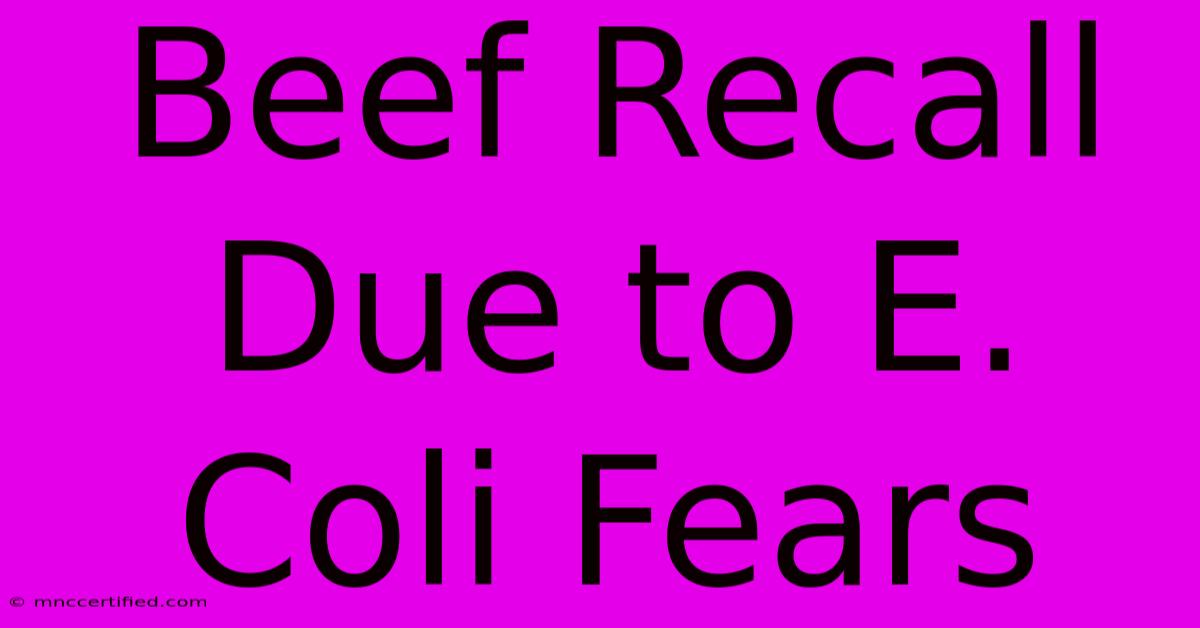Beef Recall Due To E. Coli Fears

Table of Contents
Beef Recall Due to E. Coli Fears: What You Need to Know
E. coli contamination in beef is a serious public health concern, leading to frequent recalls that impact consumers and the food industry. Understanding the reasons behind these recalls, how to identify affected products, and what steps to take if you've purchased potentially contaminated beef is crucial. This comprehensive guide will cover everything you need to know about beef recalls due to E. coli fears.
Understanding E. coli and its Dangers
Escherichia coli, or E. coli, is a type of bacteria commonly found in the intestines of humans and animals. While most strains are harmless, certain strains, like E. coli O157:H7, are pathogenic and can cause severe foodborne illness. These strains produce toxins that can lead to:
- Diarrhea (often bloody): This is a common and often severe symptom.
- Stomach cramps: Intense abdominal pain is frequently experienced.
- Vomiting: This can lead to dehydration, especially in children and the elderly.
- Hemolytic uremic syndrome (HUS): This is a serious complication, particularly in children, that can cause kidney failure.
Symptoms typically appear 2-8 days after consuming contaminated food. If you experience these symptoms after eating beef, seek medical attention immediately.
Why Beef Recalls Happen
Beef recalls initiated by the United States Department of Agriculture (USDA) or other regulatory bodies usually stem from confirmed or suspected E. coli contamination. Several factors can contribute to this contamination:
- Improper handling: Contamination can occur at any point in the beef production chain, from the farm to the processing plant to your kitchen. Inadequate hygiene practices during slaughter, processing, or transportation can introduce E. coli.
- Cross-contamination: Raw beef can contaminate other foods and surfaces if not handled carefully. This is a major source of infection in home kitchens.
- Fecal contamination: The primary source of E. coli in beef is fecal matter. Contamination can occur if animal waste comes into contact with the meat during processing.
- Insufficient cooking: Undercooked beef is a primary cause of E. coli infections. Thorough cooking to an internal temperature of 160°F (71°C) is crucial to kill the bacteria.
Identifying Recalled Beef Products
The USDA Food Safety and Inspection Service (FSIS) is responsible for issuing recalls. They provide detailed information about recalled products, including:
- Establishment number: This number is printed on the product label and identifies the processing plant.
- Product description: This will specify the type of beef (e.g., ground beef, steak), its weight, and packaging details.
- Use-by or sell-by date: This helps pinpoint the affected batches.
The FSIS website and other news outlets usually announce recalls promptly. Regularly checking the FSIS website is crucial for staying informed. Pay close attention to recall notices and check your refrigerator for any potentially affected products.
What to Do if You Have Recalled Beef
If you discover that you have purchased recalled beef, do not consume it. Follow these steps:
- Discard the product immediately: Dispose of the recalled beef in a sealed plastic bag and place it in your household trash.
- Thoroughly clean your refrigerator and any surfaces it may have touched: Use hot, soapy water and disinfectants.
- Contact the company: The recall notice will provide contact information for the company that produced the beef.
- Monitor your health: Pay close attention to any symptoms of E. coli infection and seek medical attention if needed.
Preventing E. coli Contamination at Home
Preventing E. coli infection is paramount. Follow these safe food handling practices:
- Wash your hands thoroughly: Wash your hands before and after handling raw beef.
- Keep raw beef separate: Avoid cross-contamination by storing raw beef separately from other foods.
- Cook beef to the correct temperature: Use a meat thermometer to ensure the beef reaches an internal temperature of 160°F (71°C).
- Clean your cooking surfaces: Thoroughly clean all surfaces that have come into contact with raw beef.
By understanding the risks, staying informed about recalls, and following safe food handling practices, you can significantly reduce your risk of E. coli infection from beef. Remember, your health is your responsibility. Stay vigilant, and stay safe.
Keywords: Beef recall, E. coli, food safety, USDA, FSIS, food poisoning, ground beef, contamination, recall notice, foodborne illness, safe food handling, hemolytic uremic syndrome (HUS), bacteria, meat thermometer.

Thank you for visiting our website wich cover about Beef Recall Due To E. Coli Fears. We hope the information provided has been useful to you. Feel free to contact us if you have any questions or need further assistance. See you next time and dont miss to bookmark.
Featured Posts
-
Hey Bobo Cafe Cheerful Boba Spot
Nov 22, 2024
-
Cost Of X Rays Without Insurance
Nov 22, 2024
-
Ellen And Portia Leave Us
Nov 22, 2024
-
Small Business Insurance Vermont
Nov 22, 2024
-
Espn Lewis Commits To Colorado
Nov 22, 2024